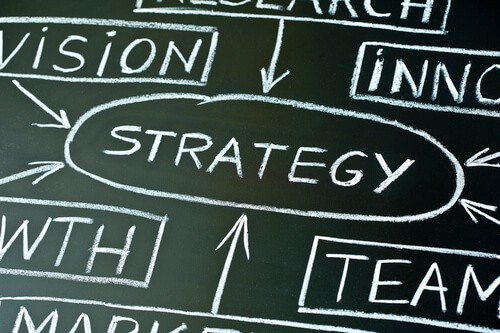~ Because we’ve done it every year is not a good reason to run a meeting! ~
Now more than ever we need to get a greater return from our events.
As event planners, we have a responsibility to ensure the events we run align with organization strategy.
Here are seven steps to achieving success:

A Missed Opportunity?
I was meeting with Mike, a successful commercial director in an international company and we were discussing his upcoming sales meeting.
This is a true story, an actual dialogue, and only the name has been changed – to protect the innocent!
Me: So, Mike, why are you organizing this sales meeting?
Mike: What do you mean “why”? I guess – because we do it every year!
Mike’s response illustrates a major recurring problem in the corporate world: corporations spend millions of dollars hiring bright management consultants and mobilizing senior executives’ time to develop a strategy.
However, when an opportunity arises to align and engage employees on the objectives to be reached through a conference or some other type of event – these same intelligent consultants and executives never harness the power of the face-to-face meetings that they are planning.
Yes, they spend a lot of time and money on the events, but when asked why they spent so much time and money – they don’t have a convincing response: because that’s what they have done every year...
The Responsibility of the Event Planner
In all fairness, senior executives have little or no experience in using face-to-face meetings to increase their organization’s business performance… and we should probably do a better job by engaging with them with better initial questions than “how many rooms do you need?” or “where have you been to previously?”
How To Align Events with Corporate Strategy
Here are seven steps to follow to align business events with corporate strategy and have a meaningful impact on the company’s business performance:
- Understand
In the planning process of any meeting, the very first step is to understand the organization’s strategy.
If you don’t know where you are going, any advisory board, sales meeting, incentive trip, or customer event will do… but you might just be throwing your money out the window with little or no impact!
Questions like: “What does success look like in three years?” or “What are three main objectives of the organization in the next 12 months?” will help you understand the context in which the face-to-face meeting will be executed… and it will definitely position you at an entirely different level.
- Identify
Take any business challenge, aligning people, increasing customer’s relationships, engaging your team, etc; these types of issues will never be solved without a face-to-face meeting down the line. Will the event be enough? Of course not! But leveraging its potential will bring the best results possible.
Accordingly, there are three types of information which need to be identified:
- What are the objectives of the meeting?
- Who are the attendees and/or various stakeholders involved?
- What does success look like, and how are you going to measure it?
Based on the insights collected, you will now be able to move to the next step and design the most effective meeting EVER!
- Design
“I’ve learned that people will forget what you said, people will forget what you did, but people will never forget how you made them feel.”
I love this quote from Maya Angelou, and this is precisely what design is all about – content, emotions, and impact.
The design includes several items like the agenda, the learning that people should receive, and the communication they will engage in (before, during and after the face-to-face).
The design, and in particular, the communication, provides an excellent opportunity to bring a lot of creativity into the content.
At the end of the day, what you are looking for is creating emotion.
It is the most important aspect of the meeting – regardless of whether it is a sales meeting, a product launch, a trade show, or incentive travel.
The emotion entails how you are going to make the attendees feel that they are part of something unique and impacting… and it is created through the design and the content coming together.
- Execute
If anything can go wrong, it will! Murphy’s Law is the most applicable rule when it comes to the execution of face-to-face meetings.
In twenty years, working in over fifty countries in the world, I have never experienced one single program that was executed exactly the way it was planned! There is always something unexpected that will happen.
Logistics are extremely important in conveying the central message of an event or meeting.
Imagine that you are planning the event to be outdoors. However, when the day of the event arrives, it’s raining, or the temperature is too cold, or the audio-visual production doesn’t deliver, then you’re not going to be able to convey your message with the same impact.
And then, of course, there is the whole discussion about pricing.
This reminds me of the story of the patient suffering from an issue that no other doctor could help her with. She decided to try yet another doctor, a very experienced and respected doctor. After 10 minutes of consultation, the physician shared her diagnosis and advice.
The patient then inquired about the cost of the appointment. After being told the amount, the patient complained about the price, mentioning that it only took the doctor ten minutes and that it was really overpriced for just ten minutes.
At that stage, the doctor looked at her and replied, “I’m not charging you for ten minutes of my time. I’m charging you for thirty years of experience and the ability to give you sound advice in ten minutes instead of hours.”
- Measure
A significant step in the process is measurement.
When you start from the objective of the meeting defined at step 2 (Identify), you will need to actually define what is it that you are going to measure (tangible and intangible) and how you are going to measure it. It is not always necessary to make an extensive ROI Study, but obviously, if you don’t measure, you don’t exist!
Finally, you need to prepare the reporting back to the different stakeholders involved in the decision-making process and by doing so, you will be able to link the specific event to the company’s strategy and its execution.
- Follow Up
You have mobilized a lot of resources to organize your face-to-face meeting. You have carefully planned the communication before the meeting and have managed to go beyond your attendees’ expectations.
Then… everybody goes home, and the next day at the office, it is business as usual, almost as if nothing had really happened. What a waste of money and missed opportunity! Think about how you can expand the benefits of the meeting.
- Uniquely Different
A common mistake is to try to always do something “more expensive,” something better “just to top the previous year.” That path leads to a dead end!
Rather than aiming to spend a lot of money or outdo the previous year’s meeting, look at doing something “different” – that’s the key to success and to a sustainable approach to face-to-face.
Looking to do it uniquely different is the key to executing a meeting with the greatest impact.
In Conclusion
We work in the greatest industry. Science, sports, politics, religions, education, etc.; face-to-face meetings are bringing people together and changing the world, one meeting at the time.
For too long, we have been concentrating almost exclusively on logistics, and we have let an important part of our work be commoditized without really thinking of the added value we are (or could be) bringing to an organization’s success.

